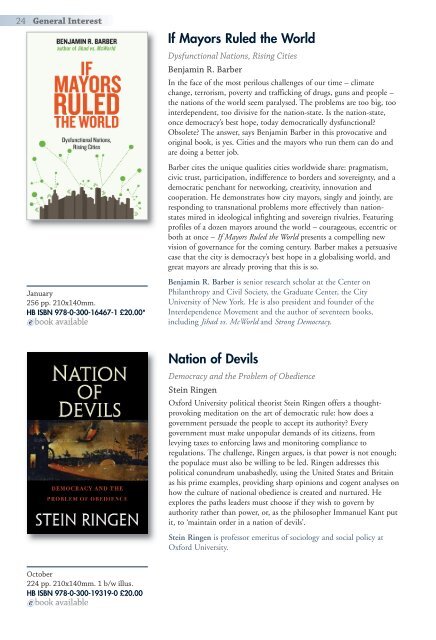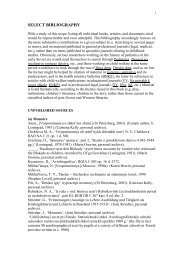View & Download - Yale University Press
View & Download - Yale University Press
View & Download - Yale University Press
You also want an ePaper? Increase the reach of your titles
YUMPU automatically turns print PDFs into web optimized ePapers that Google loves.
24 General Interest<br />
If Mayors Ruled the World<br />
Dysfunctional Nations, Rising Cities<br />
Benjamin R. Barber<br />
In the face of the most perilous challenges of our time – climate<br />
change, terrorism, poverty and trafficking of drugs, guns and people –<br />
the nations of the world seem paralysed. The problems are too big, too<br />
interdependent, too divisive for the nation-state. Is the nation-state,<br />
once democracy’s best hope, today democratically dysfunctional?<br />
Obsolete? The answer, says Benjamin Barber in this provocative and<br />
original book, is yes. Cities and the mayors who run them can do and<br />
are doing a better job.<br />
Barber cites the unique qualities cities worldwide share: pragmatism,<br />
civic trust, participation, indifference to borders and sovereignty, and a<br />
democratic penchant for networking, creativity, innovation and<br />
cooperation. He demonstrates how city mayors, singly and jointly, are<br />
responding to transnational problems more effectively than nationstates<br />
mired in ideological infighting and sovereign rivalries. Featuring<br />
profiles of a dozen mayors around the world – courageous, eccentric or<br />
both at once – If Mayors Ruled the World presents a compelling new<br />
vision of governance for the coming century. Barber makes a persuasive<br />
case that the city is democracy’s best hope in a globalising world, and<br />
great mayors are already proving that this is so.<br />
January<br />
256 pp. 210x140mm.<br />
HB ISBN 978-0-300-16467-1 £20.00*<br />
Benjamin R. Barber is senior research scholar at the Center on<br />
Philanthropy and Civil Society, the Graduate Center, the City<br />
<strong>University</strong> of New York. He is also president and founder of the<br />
Interdependence Movement and the author of seventeen books,<br />
including Jihad vs. McWorld and Strong Democracy.<br />
Nation of Devils<br />
Democracy and the Problem of Obedience<br />
Stein Ringen<br />
Oxford <strong>University</strong> political theorist Stein Ringen offers a thoughtprovoking<br />
meditation on the art of democratic rule: how does a<br />
government persuade the people to accept its authority? Every<br />
government must make unpopular demands of its citizens, from<br />
levying taxes to enforcing laws and monitoring compliance to<br />
regulations. The challenge, Ringen argues, is that power is not enough;<br />
the populace must also be willing to be led. Ringen addresses this<br />
political conundrum unabashedly, using the United States and Britain<br />
as his prime examples, providing sharp opinions and cogent analyses on<br />
how the culture of national obedience is created and nurtured. He<br />
explores the paths leaders must choose if they wish to govern by<br />
authority rather than power, or, as the philosopher Immanuel Kant put<br />
it, to ‘maintain order in a nation of devils’.<br />
Stein Ringen is professor emeritus of sociology and social policy at<br />
Oxford <strong>University</strong>.<br />
October<br />
224 pp. 210x140mm. 1 b/w illus.<br />
HB ISBN 978-0-300-19319-0 £20.00












